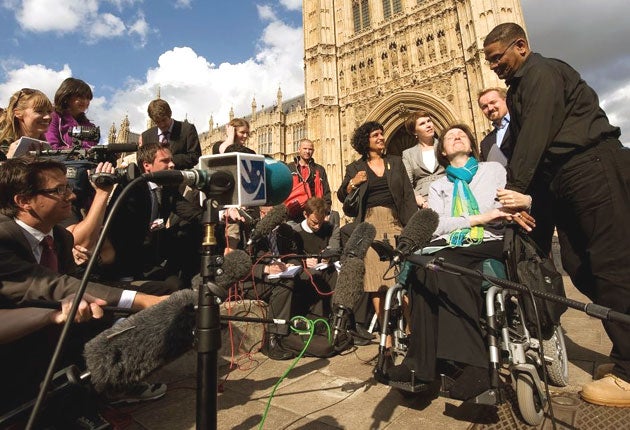Purdy court ruling 'could make assisted suicide more difficult'
GP who has helped patients die abroad fears legal move may leave relatives even more open to charges

Your support helps us to tell the story
From reproductive rights to climate change to Big Tech, The Independent is on the ground when the story is developing. Whether it's investigating the financials of Elon Musk's pro-Trump PAC or producing our latest documentary, 'The A Word', which shines a light on the American women fighting for reproductive rights, we know how important it is to parse out the facts from the messaging.
At such a critical moment in US history, we need reporters on the ground. Your donation allows us to keep sending journalists to speak to both sides of the story.
The Independent is trusted by Americans across the entire political spectrum. And unlike many other quality news outlets, we choose not to lock Americans out of our reporting and analysis with paywalls. We believe quality journalism should be available to everyone, paid for by those who can afford it.
Your support makes all the difference.A GP arrested last week for helping patients travel to Switzerland to die said yesterday that a landmark ruling on assisted suicide may make the situation more difficult for the terminally ill.
In the ruling, Debbie Purdy, who is suffering from multiple sclerosis, last week won the right to have the law on assisted suicide clarified by the law lords. As a result, the Director of Public Prosecutions (DPP) must state when prosecutions would be launched against those who accompany people abroad to take their own lives.
Ms Purdy wants her husband, Omar Puente, to be able to accompany her to a clinic in Switzerland without fear of arrest, when she chooses to die.
But Dr Michael Irwin, who has accompanied several terminally ill people to die at the Dignitas clinic in Zurich, said last night that he fears her case will in fact make it more difficult for relatives to travel with patients. Dr Irwin, who is on police bail for helping to fund a patient's death at Dignitas, said that a formal explanation of the law "could open a can of worms".
At least 115 Britons have killed themselves at Dignitas, often accompanied by relatives who risk up to 14 years in prison by travelling with them. Last week the law lords told the DPP, Keir Starmer, to clarify how his department decides whether or not to prosecute in assisted suicide cases. Dr Irwin fears that this clarification – which will appear as guidelines in September, before a consultation – will actually make relatives more vulnerable to prosecution.
"I've been concerned about the Debbie Purdy case from the start", he said. "It may make it more difficult for people because she's asking to have the [DPP] to come out publicly and say what friends and family might face.
"It all depends on the guidelines the DPP sets out in September, but he's boxed into a corner by the law lords now. Starmer himself mentioned financial gain as a consideration for guidelines and that could apply to a spouse or even grown-up children. You may have a situation where people have to rewrite a will to leave out a spouse so that they can't be prosecuted. It might have been a mistake to promote the Debbie Purdy case: it has drawn people's attention to the issue, which is good, but it could open a can of worms."
James Harris at Dignity in Dying, which has been promoting Mrs Purdy's case, said: "I don't share the concern. There may be aspects of the DPP's ruling that people want to question, but we'll have to wait until September. We think clarification is better than the current muddle where you have a blanket law which covers all assistance to suicide and isn't enforced."
Dr Irwin was arrested on Friday for giving 58-year-old terminal cancer patient Raymond Cutkelvin £1,500 towards the cost of his assisted suicide in 2007. The doctor had called on the police to arrest him a week after they arrested Mr Cutkelvin's partner of 28 years, Alan Cutkelvin Rees, 57, who also accompanied Mr Cutkelvin to the Dignitas clinic. Both men are on police bail until 23 September, but Dr Irwin says he intends to accompany another patient to the clinic in that time.
Join our commenting forum
Join thought-provoking conversations, follow other Independent readers and see their replies
Comments